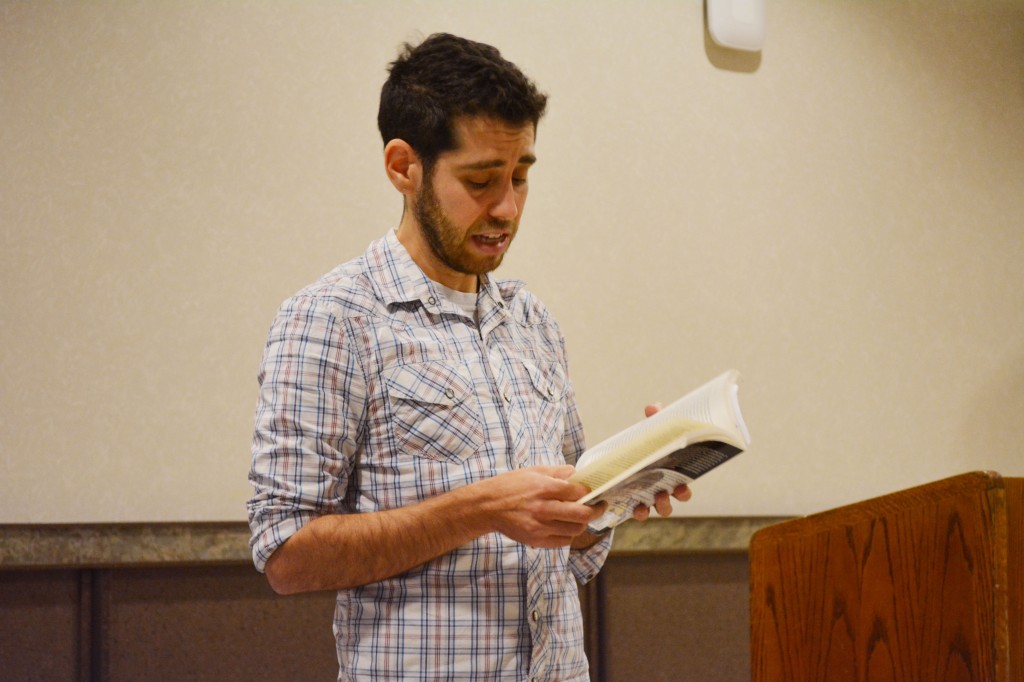
Students got a glimpse into the life of transgender author Nick Krieger and a lesson in gender fluidity Thursday night with a reading from his book, “Nina Here Nor There.”
Krieger, who spoke in the Old University Union, was born a woman named Nina and lives in California. He said he was inspired to write a novel about his period of gender questioning in response to the lack of trans memoirs that reflected his own experience.
“I kept coming across the same story: The story of being born in the wrong body and always knowing, and then taking steps to transition from one gender to the other,” Krieger said. “This wasn’t something that resonated with me, so I wanted to tell a story that I felt, to some extent, hadn’t really been told before.”
While Krieger wants to be identified as a man and presents himself as a man, he says that, anatomically, he is a woman, and still wants to remain so for now.
“I was never looking to become a man; that wasn’t what I was after,” Krieger said. “That wasn’t how I saw where I was going. I am very much in what we call the middle ground of gender, an area between man and woman.”
Krieger said he faced criticism from his gay and lesbian friends about his decision to have top surgery— the removal of his breasts— especially from his feminist friends who said they disliked the privilege associated with males. But after the surgery, he said there were many positive reactions.
“Every single one of my friends have come up to me and said ‘Oh, if I had known you were going to be this happy, I would’ve never questioned you,’” Krieger said.
The memoir was published three years ago and covers his late 20s. Krieger said he then struggled with his gender. Before his transition, he identified as a masculine lesbian and lived in a commune in San Francisco with other gays and lesbians.
In the memoir, Krieger describes the process of flattening his chest, a surgical process commonly known to transgender men as top surgery. Krieger said that six months after getting top surgery and changing his name to Nick, he began taking testosterone.
Pam Misener, a women, gender and sexuality studies professor, met Krieger while she was teaching at Dartmouth. According to Misener, Krieger asked if she wanted him to visit Binghamton University during his Northeastern college talks, and Misener agreed.
“Nick’s story is a different trans narrative,” Misener said. “Trans experiences are as diverse as any other sets of experiences, so the more we can create space for people to share their voice and share their experience, the more awareness, knowledge and understanding we can generate.”
Evelyn Chevere, a senior double-majoring in psychology and anthropology, said she enjoyed the excerpts from Krieger’s book, and that his story said a lot about perceptions of gender fluidity in today’s society.
“I think we’re in that transitory period in our generation where we’re becoming more accepting of things like this,” Chevere said. “It’s great to educate people who may come from a household where that’s not necessarily acceptable. It’s good to know that there are people out there who can help people who may be questioning their identity.”
Krieger is currently working on a second memoir that picks up a few years after his top surgery from the perspective of his newly-discovered identity.
The event was sponsored by many organizations, including the Equality Project, the Rainbow Pride Union (RPU), Residential Life and the women, gender and sexuality studies department.
Correction — A previous version of this story listed Nick Krieger as “transsexual” in the headline. Krieger is transgender, not transsexual. Pipe Dream apologizes for the mistake.


